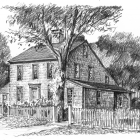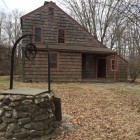Government
New Canaanites Eye Expansion of State Law That Allows for ‘Demolition Delay’ of 180 Days
|
New Canaan preservationists are watching the progress of an addendum to a state law that alllows Connecticut towns to delay by 180 days—as opposed to just 90—the razing of a structure, following a demolition application filed with local building officials. Senate Bill 330—an updated version of which arrived on the governor’s desk Monday and was endorsed 4-0 by New Canaan’s delegation to the state legislature—would take effect Oct. 1. The local ordinance that New Canaan developed exactly 10 years ago, outlined in section 12a of the Town Code, allows for a 90-day delay on a proposed demolition in cases where a formal letter of objection is filed with the Town Building Official and a committee then finds that the structure in question has “architectural, historical, or cultural importance.” Under the update to the state law, a homeowner during the delay would not be able to perform asbestos abatement, an important change. The new text reads, in part: “If a waiting period is imposed by a town … the person seeking the permit shall take no action toward demolition of the building, structure or part thereof, including, but not limited to, site remediation and asbestos abatement, during the waiting period.

